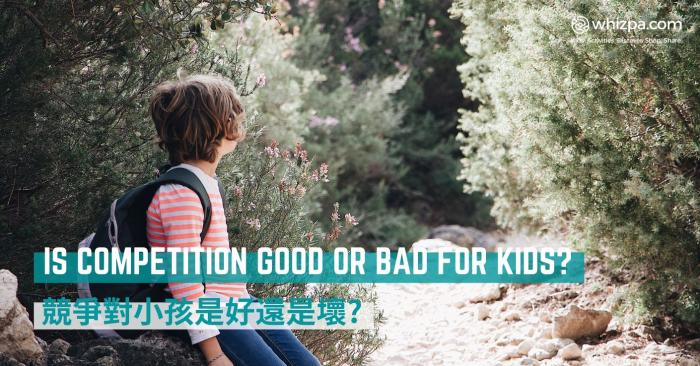
Is Competition Good or Bad for Kids?
Whether it is a race for primary school admissions, a pursuit for better grades, or preparation for the HKDSE exam, there is competition everywhere in our kids’ daily lives. Competitions begin from early childhood and continue right up to adulthood. Is competition a good thing or is it a detrimental creation of our society that we should shield our kids from? There are mixed reviews out there about the concept of competition.
Let’s start looking at some of the positives.
Here’s how competition is helpful for kids:
Promotes Character Skills
Timothy Gunn, a paediatric neuropsychologist and a judge on Lifetime Network's Child Genius: Battle of the Brightest docu-series indicates that competition helps young minds grasp the power of tenacity and perseverance. Kids realise through competitive settings that a winner is not always the one who is simply the brightest or most talented, it is rather someone who works hard, stays focused, and sticks with it. He adds “Children who engage in competition earn critical social skills through interacting with other children, while also learning the value of hard work and developing self-esteem and self-efficacy.”
Offers a Taste of Failure
One of the things parents should steer clear from is the innate desire to protect kids from failure. Failure is a great teacher. It prompts kids to work harder, try an alternative method to reach the goal, and sharpen their skills. This in turn helps our young ones flourish into adults who will sail through tough times and not crumble at the first sign of trouble. Failure helps one experience how to lose and yet be able to feel good about the effort one’s put in.
Strengthens Relationships and Emotional Connect
Competitions allow children to develop stronger communication and social skills. Whether the child wins or loses, the parent will either celebrate or comfort the child in some way. There will be a discussion. These valuable exchanges of celebrations or consolations between parent and child help cement bonds.
Let’s focus on some of the negatives of competition:
May Harbour Aggression
A winning at all cost mindset can translate into kids exhibiting behaviours that are uncalled for. They can develop unhealthy patterns of aggression and some may even resort to cheating and duping others to win, no matter what.
Possibly Hinders Performance
Competitive experiences can be perceived as stressful by some kids. When a child’s threat mode/stress mode is on, it triggers emotions such as fear of failure, feelings of unworthiness, guilt, shame etc., and these negative emotions fill up the crucial brain space which is needed for intellectual processing vital to success.
May Lead to Drop Out
When children feel they are not competent at the particular task, they lose the will and motivation to even try. The pressure to succeed is so high in competitive environments, that it kills the desire to even attempt in some kids.
Could Hamper Self-Esteem
Imagine a child loses to others in a particular sport or an event every single time. This is extremely damaging to his/her self-esteem as he/she may perceive it as he/she is never worthy enough of a win.
So what should parents do? Encourage competitive behaviours or discourage it? The key here is to facilitate healthy competitions i.e. look for healthy ways to compete. If the only goal is to win and not learn anything in the process/enjoy the process, then we are setting our kids up for discouragement. But if we parents, coaches, and caregivers learn to look at losing in a constructive way, our kids can get a lot more from the competitions they participate in.
Here’s how you may think about healthy competitions and talk about them with your children:
Encourage Growth Mindset versus Fixed Mindset
According to Carol Dweck, Standford Psychologist and author of Mindset: The New Psychology of Success, parents should help kids believe that it is possible to change, improve or add new skills with time and effort (this is called the growth mindset). They shouldn’t be made to believe that if, for instance, they are bad at football, they will continue to be bad at it for life (also called the fixed mindset). As a result, if they don’t perform well at a competitive task, they know it is not the end of the world for them. They can still learn and improve and the best thing is, this way they would continue to be willing to try and succeed.
Take Your Eyes Off of the Outcome
Take the focus off of their winning the spelling bee, the math olympiad or the swimming competition, and focus on things they can control i.e. their effort. Help your kids see what they did well regardless of the outcome. Did they show perseverance? Did they give up as soon as they hit a wall? Did they better their own time in comparison to their previous performance? This way when they enter their adulthood, they are well equipped to deal with challenges such as not clearing a job interview or not getting that promotion by introspecting at what they did well and what they can rather do to improve the next time.
Don't Let the Kids be Scared of Failure
Parents themselves shouldn’t view failure as the end of the world situation. Not only they should model it in their own lives by keeping their head high and keep moving on, they should instil in the kids too that failure is a part of success. What works wonders is if family members share experiences of failures with kids and tell them what they learned from it. Allow them to view failures simply as a part and parcel of life and equip them to deal with it in a healthy way.
Do Not Tie Your Approval to their Success Rates
You don’t want your kids to work their way to success just to impress us, the parents. This sends the wrong message to their young minds. They think “If I don’t perform well, my mom and dad won’t love me.” Kids should always feel they will have their parents’ support and will be loved unconditionally, even when they lose.
Reframe the Context
When your child feels stressed or threatened, you can help them by reframing the situation as a game or a challenge. When young people feel anxious, parents and teachers can help by downplaying the evaluative nature of the event. That way, they can use the spur of competition much more positively.
So whether you believe competition is good or bad, there is no escaping that our kids will have to face several competitive experiences. What we can control is how we let our kids perceive these experiences and react to them. As long as we can teach them how to perform to their best ability, enjoy the process and learn from it, regardless of the outcome, we are doing our jobs well. The biggest lessons our kids will learn from the competitions is that the biggest competitor they will ever face is they themselves. Kids not only need to learn in believing in themselves and their abilities, but also discover that their identities are not tied to winning or losing but to their character in either scenario. We as parents, simply need to be cognisant to this fact and shower them with all the support and encouragement we can.








